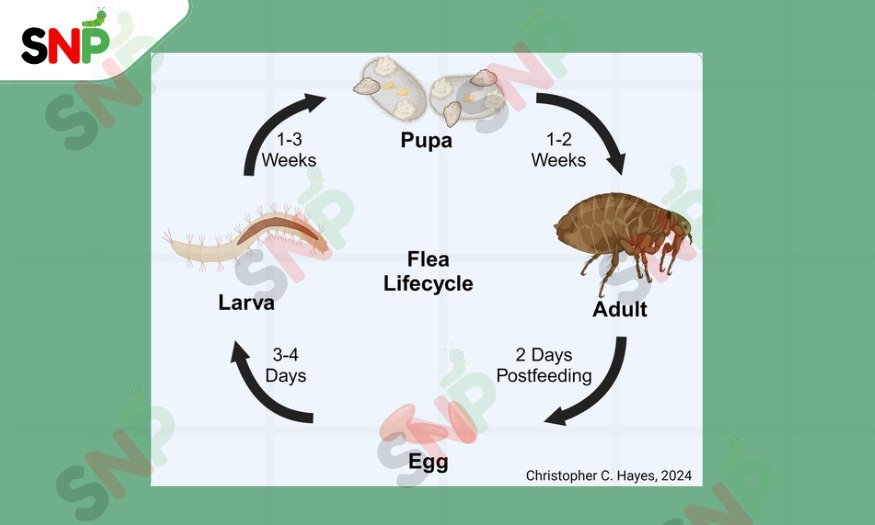Introduction to Flea Life Cycle
When you face the issue of flea invasion in your house or on your pets, it is important to know the Flea Life Cycle. This will help you to control the fleas and you will be able to protect your pets as well. Fleas are dangerous because they reproduce quickly. Also, because they can live in different climate conditions easily. Knowing the Flea Life Cycle and its stages, you will be able to attack these pests more effectively and avoid future epidemics.
Facts about a Flea Life Cycle

The Flea Life Cycle includes four different stages:
- Flea eggs
- Larvae
- Pupae
- Adult fleas.
Every stage has its difficulties and needs certain control measures. Each adult flea you observe has dozens of younger ones hiding in carpets, beds, and on floors, inside cracks, and so on. This is why it is important to consider the whole Flea Life Cycle when organizing pest control.
A Brief on Flea Eggs

The Flea Life Cycle begins with flea eggs. Adult female fleas deposit flea eggs on their host, which is typically a pet, after feeding. These flea eggs are small, oval and white or cream in color and are hard to see. Since the eggs of fleas are smooth, they can easily drop off the animal and spread all over the house- landing in carpets, beddings, furniture, and even in the soil outside.
Generally, the flea eggs may hatch in a time period ranging from 1 to 12 days, still, some of them may lie dormant for weeks or even months if the conditions are changed. This feature of the flea eggs is the main reason why they are so hard to get rid of and why the infestation can still be there after the treatment.
Stages of a Flea Lifecycle
The four stages of a flea’s life cycle are mentioned below! At each stage, the flea displays unique features.
1. Flea Eggs
After a blood meal, adult fleas lay grease fleas on their host. One female can lay approximately 50 eggs in a single day. Most of the grease flea eggs fall off the host and gather in the environment, particularly in areas where the pet population is high. The hatching of the flea eggs takes place in 1 to 12 days period depending on the temperature.
2. Larvae
After hatching, the flea eggs turn into larvae, hence small worm-like figures that are frightened of the light and are always in the search of dark and warm places are called the flea larvae. Flea larvae consume decomposed material that consists of flea droppings and skin cells. The duration of this stage is approximately 5 to 11 days.
3. Pupae
The grown up, flea larvae now make a protective cocoon and thus they reach the pupal stage. The cocoon is not only sticky but also camouflaged with debris, hence the pupae become hardly visible and also they are resistant to many treatments.
During the dormant period, which can last for several weeks or even months, pupae are still there and only upon receiving signals such as vibrations, heat, or carbon dioxide, they will decide to come out as adults.
4. Adult Fleas
Adult fleas come out of their cocoons when they detect a host in the vicinity. They do not waste time in looking for a blood meal and they can also start laying flea eggs within 1-2 days. Adult fleas have a lifespan of about 2–3 months, but they are capable of living longer if the conditions are suitable.
It is estimated that only 5% of the total flea population is at the adult stage, hence most of the fleas are going to be in the earlier stages and they will always be hidden to the naked eye.

Conclusion
For the owner of a dog or cat who is having a flea problem, its important to understand that if you simply kill the adult fleas you still have a big problem. The problem I am talking about is the flea larva and the flea eggs. Therefore, to make pest control more effective, a plan for the entire life cycle of the insect, especially the places, where the eggs and larvae may be hiding is needed. By being smart and treating all the life stages you will be able to distrupt the process. This will keep your home and your pets safe.

Leave a Reply